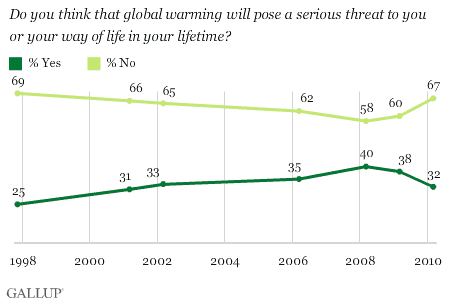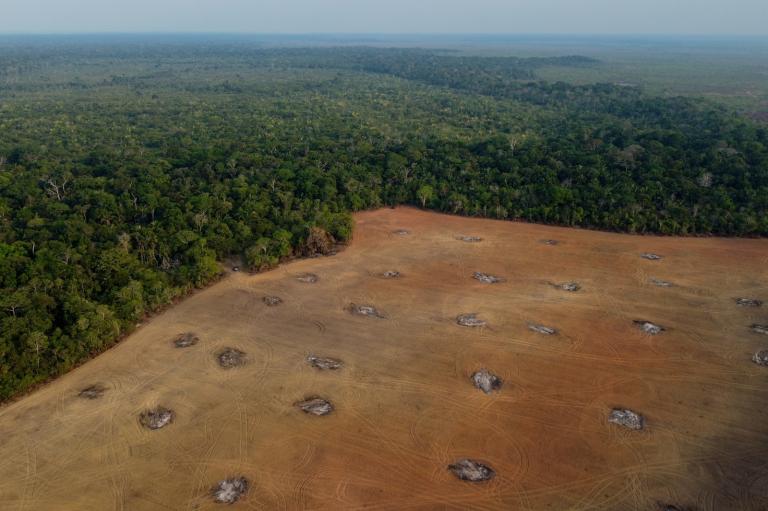I wrote last year “the best climate reporter in the country is Al Gore, a former journalist, a brilliant synthesizer and communicator.”
Who could have imagined that a film of him giving a PowerPoint presentation about climate science would be the 5th highest grossing documentary of all time in this country?
Yet filmmaker/scientist Randy Olson wrote this month:
You want to know why Al Gore and his movie have proven to be such an abject failure? (And yes, failure is the right word — polling shows no net increase in public concern about global warming in the years following the movie — for two decades its been roughly a third of the public who are seriously worried about global warming.) It’s for this very reason. A very dull and dispassionate voice was chosen to deliver a supposedly dire and passionate message. It was one of the worst cases of bad casting in history. Gore is ultimately “a scientist” when it comes to communication instincts. You can see it played out in his movie and two books as he’s slowly come to the realization that you need something more than information to reach the masses. Duh.
Ouch.
I’ll come back to the issue of polling, which I don’t actually think bears this view out — even if it were a reasonable metric for judging the success of a documentary.
But what floored me is that I had just finished Olson’s pretty good book, Don’t Be Such a Scientist: Talking Substance in an Age of Style. In that book, just published in late August 2009, Olson says almost the exact opposite (pages 107 – 108):
Before I begin this discussion, I want to make my overall opinion clear concerning Al Gore’s movie An Inconvenient Truth. It is, plainly and simply, the most important and best-made piece of environmental media and history. End of story.
You can talk about Rachel Carson’s Silent Spring and how it gave birth to the entire environmental movement, but Al Gore’s movie took the broadest and most urgent environmental issue and jumped it up from background noise to buzzword. There’s no point talking about any shortcomings as if they mattered. You can expect only so much from a single piece of media. His movie went way beyond what anyone could have realistically expected. In the spring of 2006, when I was at the Tribeca film Festival with Flock of Dodos, I heard skeptics in the independent film world laughing about Al’s movie being “a PowerPoint talk — who’s gonna wanna buy a ticket to a movie theater to see that?” Most of them couldn’t believe it when the movie scored over $50 million in worldwide box office. It was an unmitigated success that deserved to win both an Academy award and the Nobel Prize, and, guess what, it did. Total success….
The movie is a personal narrative by former vice president and Democratic presidential nominee Al Gore about his lifelong connection to the topic of global warming, dating back to his undergraduate days. Interwoven with his PowerPoint presentation of the impending risks of global warming are personal insights, in which Gore reveals the pain of tragedies involving his sister and his son, as well as occasional humorous quips…..
The Al Gore movie is slick, cool, and as hip as the formerly dull vice president could possibly be package. It scores close to an A for style. And when it comes to substance, it has plenty. That’s why he won an Oscar — it’s rich in both substance and style.
You can check these quotes on Amazon here.
I agree with this part of Olson’s assessment in the book. And I’ll give my “review” of his book at the end.
Gore has become a terrific speaker on a very difficult subject — climate science — as anyone who has heard him in recent years can attest. Of course, he’s been demonized by the anti-science ideologues, which limits how effective a communicator he can be to the groups who find the anti-science ideologues credible — but that is also true of many actual first-rate climate scientists, like Hansen, Schneider, Mann, Santer and so on.
Gore’s film is remarkably accurate — far more accurate than the body of work of any practicing climate journalist. I discussed the issues raised about a handful of the thousands of facts presented in the movie here. But let me again refer people to RealClimate’s analysis of the UK court case on the film:
Overall, our verdict is that the 9 points are not “errors” at all (with possibly one unwise choice of tense on the island evacuation point).
So it was a staggeringly effective documentary that was substantive and accurate. But what about the polling? Well, let me just note that the highest grossing documentary of all time in this country is Fahrenheit 9/11, released June 2004 — and Bush still got reelected!
Also, here is the most recent Gallup polling on one of the central issues addressed by Gore’s movie:

In fact, Gore’s movie and book and the temporary media surge around it I think can be plausibly said to have contributed to the slight and temporary improvement in numbers here from early 2006 to early 2008. Of course, it’s hard to separate out the impact from the IPCC reports released in 2007. But there is certainly no evidence that Gore’s film or his media outreach on it had no impact or failed. He can’t be blamed for poll numbers nearly 4 years later!
Recently, of course, there has been a massive uptick in the disinformation campaign and a worsening of media coverage (see Boykoff on “Exaggerating Denialism: Media Representations of Outlier Views on Climate Change”). And at the same time, many in the environmental community and political world decided to downplay talk of global warming (see Messaging 101b: EcoAmerica’s phrase ‘our deteriorating atmosphere’ isn’t going to replace ‘global warming’ — and that’s a good thing). And there are many, many other factors that have affected recent polling, as I’ve written: “One more reason that recent U.S. polling on global warming is down slightly” and “Large majority of Americans continue to believe global warming is real and trust scientists.”
Gore himself has been pushing action on clean energy as much as he has been talking about global warming recently (partly I think in response to criticisms of the original movie for not offering enough solutions). And the polling shows public support for action on climate and clean energy remains very strong, as I’ve reported over and over again (see “Overwhelming US Public Support for Global Warming Action” and “Memo to policymakers: Public STILL favors the transition to clean energy“). So that message is working.
There is no perfect messenger — just as there is no single form of communication. Some folks make documentary films. Some folks blog. And as I said, the anti-science crowd demonizes all of the best messengers on the science, in an effort to limit their effectiveness.
Don’t Be Such a Scientist
Finally, I can recommend Don’t Be Such a Scientist for non-climate scientists who want some insight into better communications and messaging told in a pretty entertaining, personalized fashion. I think the overall recommendations for better communications and dealing with the media are useful for general scientists. Indeed, I think we need many such books, and I would urge scientists to read as much on the subject as possible. After all, science journalism is “basically going out of existence,” so scientists will need to figure out how to talk to the public directly.
But I think that climate scientists are in a completely different ballgame, with a much, much tougher media environment than most scientists have to deal with — along with a powerful disinformation campaign that requires a different messaging strategy. When one of the most prestigious scientific journals in the world, Nature, editorializes — “Scientists must now emphasize the science, while acknowledging that they are in a street fight” — you know you are in a very different communications environment than scientists have ever seen before.
We all have strengths and weaknesses as communicators. The trick is to find the venues that best take advantage of your strengths while continually working to overcome your weaknesses. But now that we are in a street fight, we can’t expect any one person to win it for the rest us.
Every single one of us needs to work hard to improve our messaging and communicate on this subject in every venue — because the future of all our children and grandchildren and future generations are at stake.

